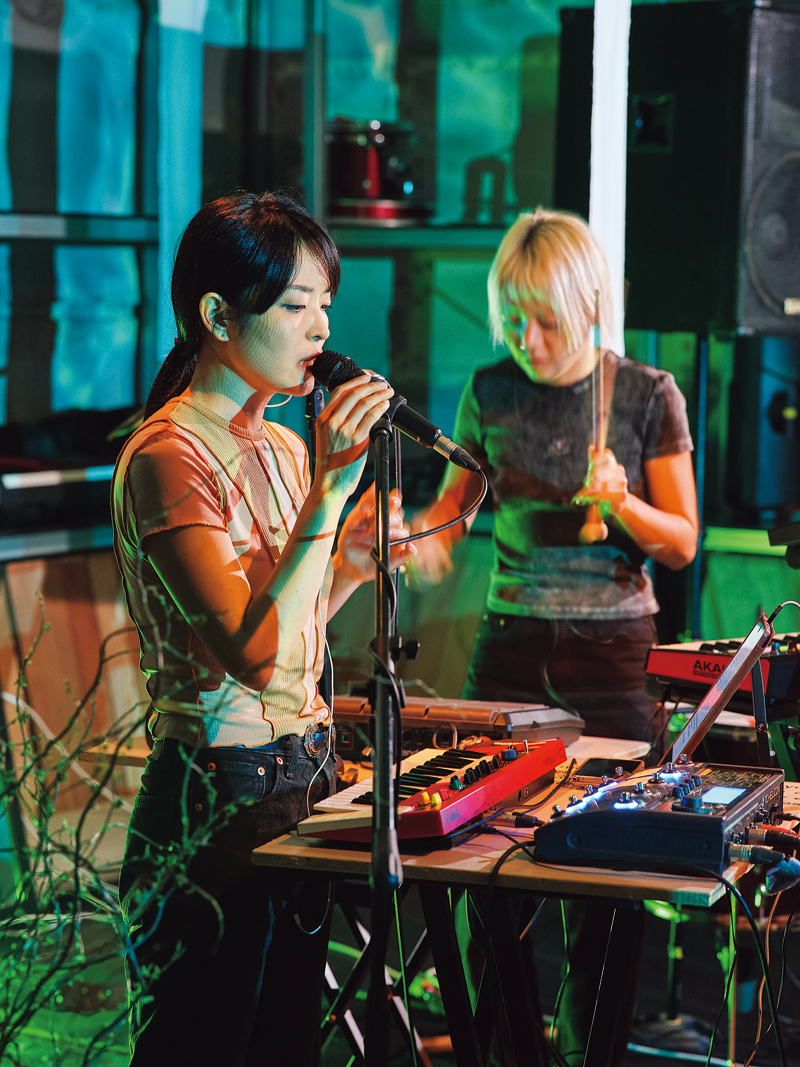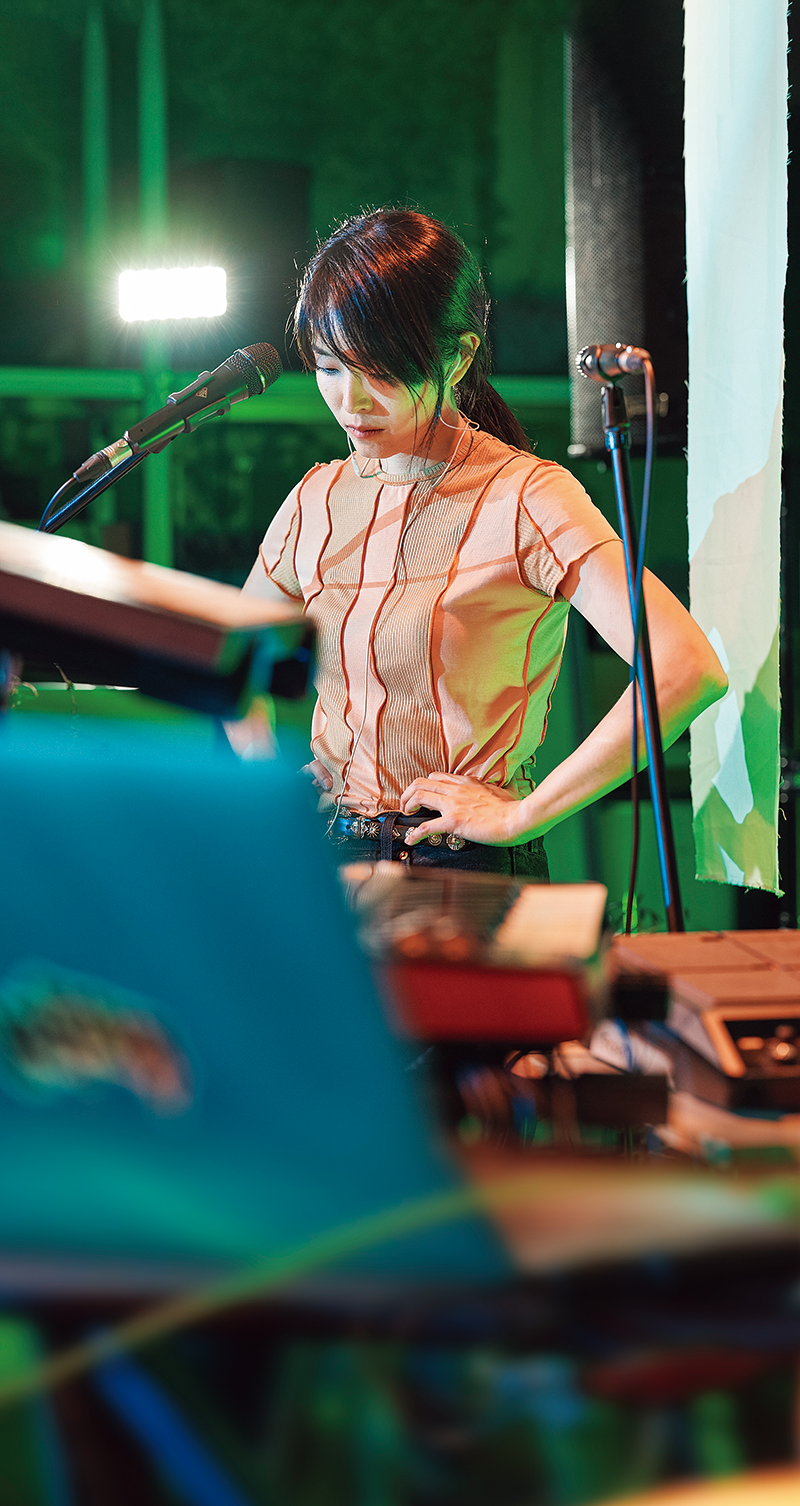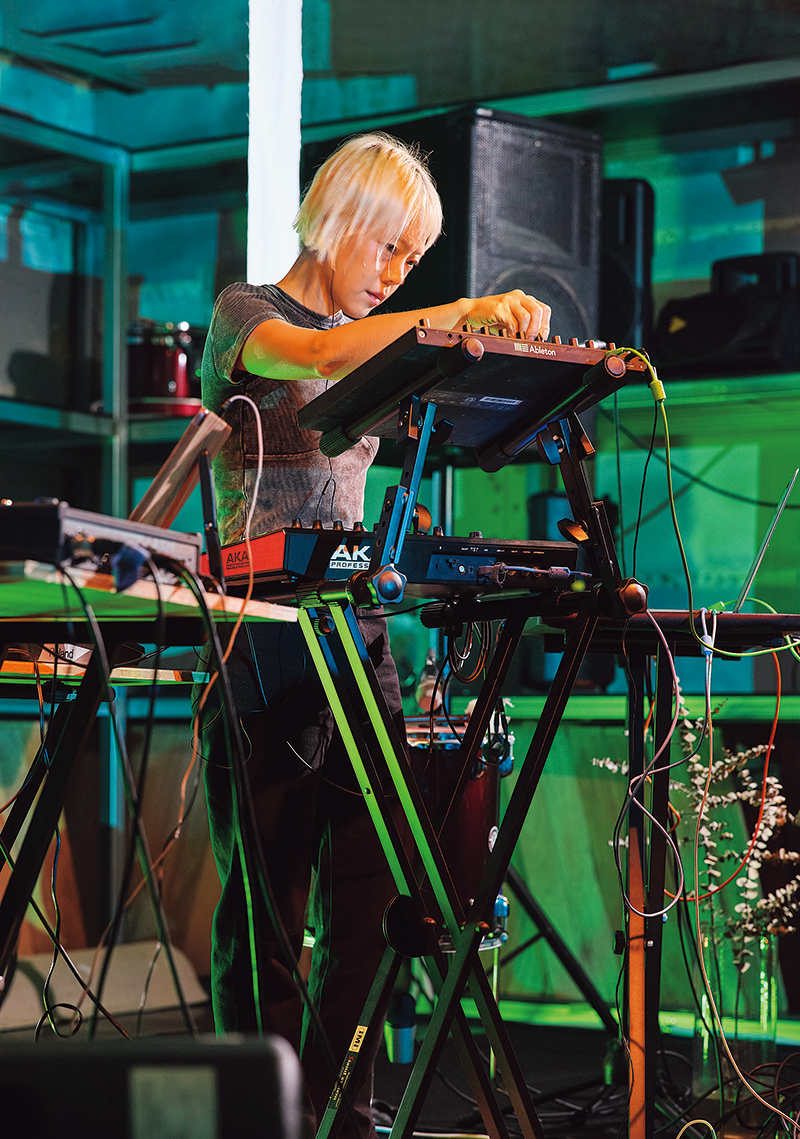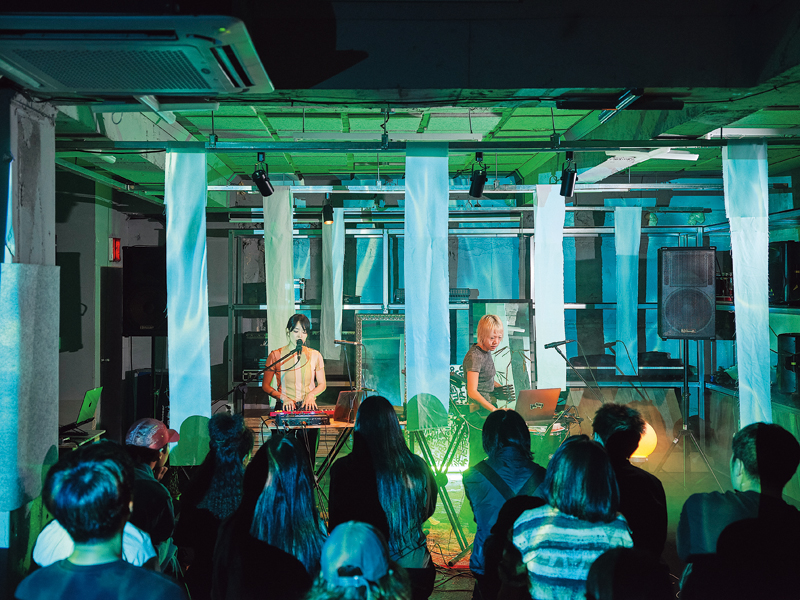Formed in 2020, the duo HAEPAARY reinterprets traditional Korean music with electronic beats. At the 2022 Korean Music Awards, the pair collected the Best Electronic Album and Best Electronic Song accolades. We caught up with them at Mudaeruk, a multipurpose cultural space in Hapjeong-dong, Seoul.

Alternative electronic duo HAEPAARY was formed in 2020 by singer MINHEE (left) and instrumentalist HYEWON. Their musical works combine electronic music and traditional Korean music, while reinterpreting both. They are regarded as trend-setters in the Korean electronic music scene.
In 2019, the song “Tiger is Coming,” a single by alternative pop band LEENALCHI, made a big splash upon its release. The band’s post-punk reinterpretation of the
pansori (musical storytelling) piece
Sugungga (Water Palace Song) mesmerized audiences, and people began to pay closer attention to music that combined folk and pop elements.

A Shining Warrior — A Heartfelt Joy
One of the songs on HAEPAARY’s first EP, Born by Gorgeousness, was released in 2021. The album won Best Electronic Album at the 2022 Korean Music Awards.
HAEPAARY, the electronic music duo formed by MINHEE and HYEWON, joined the genre in 2021. Their debut song, “Somu-dokgyeong” (A Shining Warrior - A Heartfelt Joy),” plays over a cold, almost ambient beat, together with Jongmyo ritual music used in ceremonies to honor Joseon kings and queens. While classical Korean percussion shines through, the inclusion of a low-pitched narration in the second half resembles a horror movie soundtrack.
Noted for the originality of their musical universe, HAEPAARY’s image is sharp and revolutionary. Although they draw on centuries-old Korean musical traditions, they also deconstruct anachronistic texts and shatter gender roles. For example, they sometimes sing
namchang gagok, songs reserved for male performers, and reinterpret the male-dominated culture of the Joseon Dynasty from a female perspective. It is no mystery why young people disillusioned with conventional and conservative music would be excited by such a fresh take on traditional genres.
How did your music interests evolve?
HYEWON: When I was younger, I was a member of the Kim Duk Soo Children’s Arts Troupe. I was a huge fan of the album collaboration between Kim Duk Soo and the international jazz group Red Sun, and it really made me ask: “How does one play with traditional beats like this?” I also performed with the world music group wHOOL, and I have always been interested in learning new things. After graduating from a high school specializing in gugak (traditional Korean music) and entering college, I fell in love with electronic music.
MINHEE: As a child, my father made sure that I learned sijo (traditional Korean poetic songs) and gagok (slow lyrical songs). It was while I was learning sijo, yeochang gagok (songs reserved for female performers), and gasa (longer traditional Korean poetic songs) that I realized I didn’t want to go to a regular high school. In middle school, I loved the American rapper Tupac Shakur and was enthusiastic about songs like “Poppy” by Korean punk rock pioneers Crying Nut. I also listened to the British metal band Black Sabbath, which my brother’s friends were fans of.
Then I enrolled in a gugak high school and heard Sujecheon, a traditional instrumental composition, for the first time, which was a real shock to my system. It was way wilder than the progressive rock and art rock I had been used to. I think it was around that time that I realized I wanted to be a very radical artist like the gayageum player Hwang Byung-ki or video artist Nam June Paik.
What has been the reaction since your debut?
MINHEE: Our biggest goal and challenge was to establish ourselves in the electronic music and even pop music market without being lumped in with the K-pop scene. I think being nominated for Best New Artist at the 2022 Korean Music Awards alongside K-pop groups like æspa and having our album placed next to ambient music duo Salamanda in record stores were both significant milestones in helping us achieve that goal.
How is HAEPAARY viewed in electronic music circles?
HYEWON: Often the first thing we are asked about are our instrument sources, maybe because we use a lot of unique sounds. Sometimes I sample gugak sources, but usually I make slight variations on sources used by other electronic musicians. We don’t intentionally try to use gugak elements, but I think our music has a gugak feel to it because both gugak and pop influences are prominent in our music.
What is your stance on K-pop?

go to gpd and then
A twisted interpretation of a traditional namchang gagok (a folk song reserved for male performers), this song won the Best Electronic Song accolade at the 2022 Korean Music Awards.
MINHEE: As an audience member, I love K-pop. But as creators, we take different paths. They aim for polish, and we aim for different textures. For example, notes that deviate from the average scale, beats that deviate from the norm, things like that. We are different from K-pop in many ways, including in our approach to intellectual property. We have never been trained to perform like idol groups, either, so there is fear that we’ll be dismissed as clumsy and boring before people even have a chance to unpack our intentions.
Mixing old and modern influences must be difficult.
HYEWON: It’s a challenge when recording an album, too, but we hit even bigger obstacles when performing live. Minhee’s traditional singing and vocalization often do not work well with the electronic sounds that are projected on stage, so we must adjust the sound mix-up until the very last minute. Working on our album, we even tried using a vocoder, which replaces human pitches with mechanical ones, like the French electronic duo Daft Punk does, but it didn’t work.
MINHEE: The Spanish musician Rosalía, who reinterprets flamenco classics in a modern way, and the Israeli group A-WA that mixes traditional Yemenite Jewish music with hip-hop, are good models. Of course, their circumstances are different from ours. In their case, their own traditional influences work well with modern beats, whereas we still struggle to combine the nuances of traditional Korean songs with what we have now. It’s difficult but rewarding.
HYEWON: In our music, we often mix the two-beat system of Western electronic music with the three-beat system of gugak. Some people ask us if Minhee’s vocals are off-beat, and whether they shouldn’t be corrected by the mixing engineer, but we find that to be the charm and the appeal.
I’m intrigued by the idea of reinterpretations that subvert the gender roles we find in traditional texts.
MINHEE: Gender is not the only lens we’re interested in. For one of our performances, we interpreted the famous poem “Has the Sun Risen in the East Window?” by the noted Joseon Dynasty scholar-official Nam Gu-man (1629-1711), and we just couldn’t get over the following line: “Is the boy herding the cattle awake yet?” I mean, that’s exploitation of children, right? And our song “The Night It Started” deals with the love of sexual minorities. To us, it feels very natural to question certain things that were largely taken for granted until the 21st century—misogyny, exploitation of vulnerable people, and other social injustices—and transform them into art.
What are your plans for 2023 and beyond?
HYEWON: We are preparing our first studio album. In October, we plan to participate in the world music festival WOMEX in Spain. But we would like to play more electronic music than world music festivals.
MINHEE: We want to perform for audiences who go wild and get “drunk” on the show, rather than for people who sit and listen quietly. So, moving forward, we plan to make a lot of exciting music.

HAEPAARY performing at Mudaeruk, a multipurpose cultural space in Hapjeong-dong, Seoul, on May 20, 2023. The duo strives to create songs that excite the audience into jumping up and down.
Lim Hee-yun Music Critic
Heo Dong-wuk Photographer